Thursday Feb 19, 2026
Thursday Feb 19, 2026
Thursday, 14 January 2021 00:03 - - {{hitsCtrl.values.hits}}
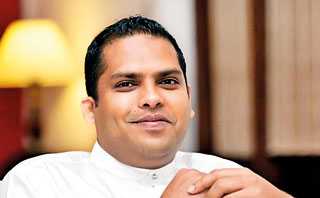
Harin didn’t call the President names; he called the President by one of his given names, the N-word
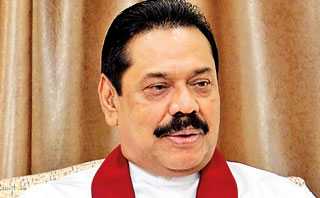
Mahinda Rajapaksa when mocked as “Percy Mahindra,” reacted only with his engagingly rascally grin
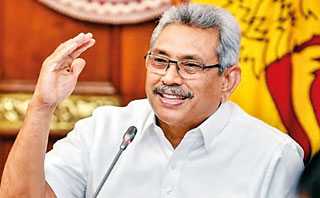
The contrast between the first President Rajapaksa and his successor-sibling couldn’t be greater
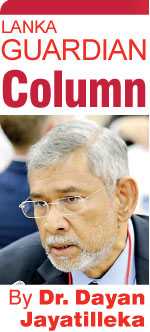 What US commentators said throughout the Capitol Hill riot by the nativist Far-Right and the convulsions of the Trump administration, is true of Sri Lanka in this early-mid period of a ‘Tougher than Trump’ regime, more Rudy Giuliani and Michael Flynn than ‘the Donald’: “it’s Crazytown!” (That echoes the punch-line of the noir masterpiece with Jack Nicholson and Faye Dunaway: “…it’s Chinatown”.)
What US commentators said throughout the Capitol Hill riot by the nativist Far-Right and the convulsions of the Trump administration, is true of Sri Lanka in this early-mid period of a ‘Tougher than Trump’ regime, more Rudy Giuliani and Michael Flynn than ‘the Donald’: “it’s Crazytown!” (That echoes the punch-line of the noir masterpiece with Jack Nicholson and Faye Dunaway: “…it’s Chinatown”.)
The first 10 days of 2021 were a roller-coaster ride, with President Trump inciting his Far-Right base assembled in Washington DC, the resultant storming of the Capitol by violent ultranationalist mobs, and President Gotabaya Rajapaksa’s menacing remarks exultantly invoking memories of gory lethality, triggered by a strident yet utterly unthreatening speech by a youthful SJB parliamentarian.
Both Presidents, who share an ideology and a proud absence of political experience, had their timing off. It was the week the Democrats won Georgia and took control of the US Senate, thereby controlling both Houses of Congress.
Terrorist-civilian distinction
It isn’t every day that a sitting President freely admits that he is endowed with two personalities. President Gotabaya bragged about it in a speech in Ampara, shown on TV news on Saturday, 9 January. And that sure isn’t all he said:
“…However, Nandasena Gotabaya has two characters [personalities]. Sometimes the Buddhist clergy still says to me that ‘we don’t want President Gotabaya; we want the Secretary of Defence—you must be a little harsh’. That also can be done. If that is the approach, I can also do it with that approach…You saw what happened to Prabhakaran when he began by trying to kill me with a bomb attack at the Pittala junction when I was Secretary Defence. But I finished it, with his body being carried like a dead dog on all fours at Nandikadal. [Things] Can be taken to that level too…”
What is alarmingly dangerous is that in President Gotabaya Rajapaksa’s mind, young Harin Fernando’s fiery parliamentary speech and cheeky use of the President’s first name ‘Nandasena’, was equated with the bomb attack on him by Prabhakaran’s terrorists. This casts a dark shadow not only over the future but also the past—which is counterproductive for the country and the President himself.
If in peacetime, a President can conflate an attack by a notorious terrorist leader with an unthreatening if spirited criticism by an unarmed civilian, a young legislator, and that triggers the public threat (accompanied by a menacing chuckle) of the return of the President’s previous persona, the Secretary/Defence, which he publicly associates with the extermination of the terrorist leader after a bloody campaign, then the question may logically arise in the mind of the international community and international public opinion at large, as to what might have happened to the vital terrorist/civilian distinction, as well as the armed combatant/surrendee-captive distinction, the basis of the laws of war, when that other persona he boasts of, the Secretary/Defence, was making decisions and managing the war effort?
Harin didn’t call the President names; he called the President by one of his given names, the N-word. President Mahinda Rajapaksa was mocked by Oppositionists using his original Anglo-Indian names “Percy Mahindra,” and reacted only with his engagingly rascally grin. The contrast between the first President Rajapaksa and his successor-sibling couldn’t be greater. President MR enjoyed a performance of Puswedilla which satirised him. There will be no such play at the Lionel Wendt about President GR (Puswedilla never satirised Secretary/Defence GR anyway), and if there were, it might once again trigger fond memories and a delightful recounting of Prabhakaran’s denouement.
In his Ampara outburst, President Gotabaya Rajapaksa made frequent reference to the wishes of the Maha Sangha (the Buddhist clergy) as his cues, so perhaps the Buddhist Advisory Council member Ven. Vendaruwe Upali Thero’s matchless, indelible 2018 birthday wish for him has kicked-in. These transparently threatening, blood-curdling Ampara remarks by President GR should make an interesting impression at the Inter-Parliamentary Union (IPU) in Geneva, and legislatures the world over.
Meanwhile a fond memory of Peruvian President Fujimori, who made much of stepping arrogantly over the dead bodies of terrorists, struck me.
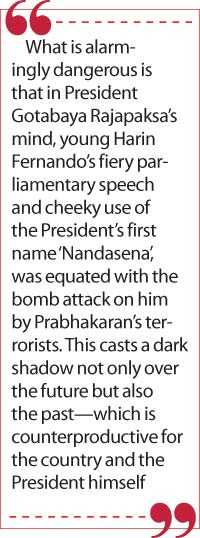 |
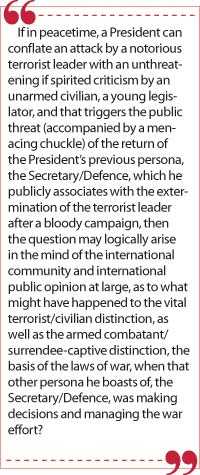 |
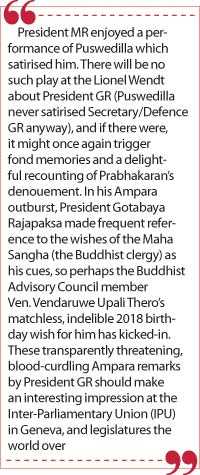 |
USA-democracy-Sri Lanka
On balance the week brought good news for the USA and the world, including Sri Lanka. For the Sri Lankan regime, not so much.
The Democrats win in Georgia gives the Biden presidency a chance that the Obama presidency didn’t have due to the obstructionism of the Republican majority in the Senate. The storming of the Capitol building and national and international exposure of the anti-democratic character of Far-Right nativism, is not the strategic dent for the USA in global affairs that America’s adversaries think it is.
The US Democratic primaries, the George Floyd protest movement, the Georgia battle, the delegitimisation of the Republican Right and the moral implosion of the Trump Presidency, all form part of a dramatic story of struggle and redemption of Democracy as idea and system.
The message of President-elect Biden which quoted his granddaughter and contrasted the brutality of the handling of the George Floyd/BLM protests in Washington DC with the institutional permissiveness displayed towards the Far-Right fanatics, showed how the centrist-liberal President-elect of the USA has been propelled towards a social-justice and racial equality discourse by the interacting dynamics of the crisis and the Movement. I see Biden, but I hear Bobby Kennedy (another Irish Catholic) in the 1968 campaign. (I belong to that global generation of those who can remember where they were when they heard of JFK’s and RFK’s deaths.)
The forces of history have moved in such a manner that the USA will have the most progressive-oriented Presidency since Barack Obama; one that is more able to push a progressive agenda locally and globally due to the Senate majority, the actual social energies unleashed among and by the American youth, and the need to ideologically reconfigure and recharge to repair the damage that Trump has caused and face the rising global power which is America’s and democracy’s systemic and ideological challenger.
There is a striking convergence of Irish Catholicism, the Black Baptist Church and Jewish liberalism. Apart from President-elect Biden himself, incoming National Security Advisor Jake Sullivan (appearing on Fareed Zakaria GPS) identified his own Irish Catholic non-elitist roots as more important than his Ivy League education. Reverend Rafael Warnock is a left-leaning successor to Martin Luther King Jr., while Jon Ossof is a Jewish liberal.
Together with the progressivism of Pope Francis, as exemplified in his Fratelli Tutti encyclical (coincidentally released at the start of the US presidential campaign) highlighting fraternity and equality while rejecting both neoliberal globalism and tribalist ultra-nationalism, this confluence portends a shift towards the values of universality and justice as drivers of the new democratic Zeitgeist which will take on authoritarian Far-Right ultranationalism and Eastern techno-totalitarianism.
It is not merely that the USA is coming back. It is that the romance with the adventure and heroism of democracy and its necessary battles, is back. Democracy will build back better.
A Democrat-led Senate plus House of Representatives i.e., a Democrat-run Congress, will be far more sensitive to issues of human rights, social justice and racial equality, and far more opposed to militarist-despotism, ultranationalist supremacism and xenophobia, than ever before. That is not good news for the ‘tropical Trump’ Gotabaya presidency.
The Jaishankar visit
As the curtain fell on India’s External Affairs Minister Dr. Jaishankar’s two-day trip, there was no joint statement which accompanies a high-level visit by a close friend. Even if there is no agreement or consensus, a joint statement which captures the essential points made by each side attributed as such, is the diplomatic norm. That happened at the conclusion of the Modi-Mahinda virtual summit. The absence of a joint statement this time must mean that the gap on substance was too wide: the minimum that one side would want included must have fallen short of the maximum the other was willing to accommodate as part of a single text.
There was a press statement after the joint media briefing by the Indian and Sri Lankan Foreign Ministers. The press statement was NOT a joint one but contained the points made by the Indian Foreign Minister. Dr. Jaishankar’s statement followed the meeting that morning with President Gotabaya Rajapaksa.
Pointed reference was made to ‘shared democratic traditions’—implicitly multiparty and pluralist—in an obvious contrast with other world players in Sri Lanka who do not belong to the democratic extended family and therefore do not engage across a diverse spectrum: “… In line with our shared democratic traditions, meetings are also planned with other important political and community leaders.”
The most important marker was the 13th Amendment. The reference demolished the delusions of the regime that India could be persuaded (by economic carrots) or pressurised (by name-calling and/or the China card) into forgetting the Tamil factor, the devolution dimension and the 13th Amendment. The passage is worth quoting in full:
“9. As we promote peace and well-being in the region, India has been strongly committed to the unity, stability and territorial integrity of Sri Lanka. Our support for the reconciliation process in Sri Lanka is longstanding, as indeed for an inclusive political outlook that encourages ethnic harmony. It is in Sri Lanka’s own interest that the expectations of the Tamil people for equality, justice, peace and dignity within a united Sri Lanka are fulfilled. That applies equally to the commitments made by the Sri Lankan Government on meaningful devolution, including the 13th Amendment to the Constitution. The progress and prosperity of Sri Lanka will surely be advanced as a consequence.”
Dr. Jaishankar means that in India’s view, it is NOT and WOULD NOT BE “in Sri Lanka’s own interest” that “the expectations of the Tamil people for equality, justice, peace and dignity within a united Sri Lanka” remain unfulfilled. That in India’s view, it is unacceptable that be left to the unilateral interpretation and sole discretion of the Sri Lankan government, is made clear by the reference to the 13th Amendment.
If President GR’s external relations ‘new normal’ is that reference to specific Tamil expectations and the 13th Amendment are taboo, and that China’s underwriting in its New Year’s Day message would deter India from such references, then the Indian Foreign Minister studiedly failed to abide by it.
Provoking extremism
Following an FBI investigation, the US Department of Justice charged three Sri Lankans, presently in custody in Sri Lanka, for their role in the Easter Sunday massacre. The DOJ was involved because five US citizens died in the attacks. The Sri Lankan authorities proved infinitely superior to the US Justice Department, because the American list carelessly omits any Muslim parliamentarians or Supreme Court lawyers with Egyptian wives and Iranian money.
The regime’s policy of shoving the Muslims and Tamils around, risking radicalisation, is based on a calculation that the Sinhala vote is 75% of the Sri Lankan voting population, and therefore, while ethnic supremacism didn’t work for Trump in 2020 in the USA which has a white voter population of 70%, it will continue to do so in Sri Lanka as it does in Israel. The fact that the Tamils and Muslims are not disenfranchised will be managed by electoral delimitation and near-abolition of proportional representation.
The Gotabaya strategy assumes that he can govern the north and east without Tamil allies and partners, or while weakening them politically. He should note that though the TNA lost the mayoralty of Jaffna, which went to an EPDP-backed candidate, that new Mayor (literally) stood by the university students protesting the arbitrary demolition of the monument.
Just as Dr. Jaishankar left the island, President Gotabaya achieved the impossible: the rekindling of long-dormant Tamil Nadu political solidarity with their cross-border ethnic kin and the convergence of the moderate mainstream Muslim parliamentary party and the Tamils of Northeast Sri Lanka in a peaceful civic protest (‘hartal’).
The determined marginalisation and alienation of Muslims and Tamils will turn Sri Lanka, placed at the crossroads of the Indian Ocean, into a vector of extremism and militancy that will be a threat to the whole region including India. Externally, the Government will be held responsible.
Democracy: Building back better
The (neo)liberal reflex action is to insist on the broadest in-gathering of democratic opposition elements, headed by the Old Guard establishment elite. That’s dumb.
David Sirota who currently edits the journal Jacobin, predicted the Washington riots (or ‘insurrection’ as the quality Western press calls it) in a book a decade ago. He has this to say:
“…About a decade ago, I wrote a book called ‘The Uprising,’ which described how we were entering an era of chaos in which right-wing groups would try to seize power under the guise of populism. Clearly, that has been happening — we saw it speed up during the Tea Party backlash, and it was further accelerated by Donald Trump, who is a unique president in his willingness to use the White House megaphone to foment and destabilise.” (The Insurrection Was Predictable – jacobinmag.com)
It is important to understand that the political socialisation of President Gotabaya Rajapaksa took place in precisely that environment tracked and mapped by Sirota, among wealthy Sri Lankan Republican party supporters in California, rather than the parliamentary democratic centre-left, populist milieu in which Mahinda Rajapaksa was politically socialised. Meanwhile the key insiders of President Gotabaya’s circle were politically socialised in the Sri Lankan equivalent of the Tea Party, the Sinhala-Buddhist New Right of the 1990s, adherents of the Jathika Chinthanaya cult.
Where’s the answer? David Sirota first explains what NOT to do or be:
“…In The Uprising, I argued that the best way to counter the rise of right-wing populism and to prevent it from proliferating is for an opposition movement and party to not just issue vague paeans to democracy and the soul of the nation. The opposition must also deliver tangible, material gains for working people — rather than continuing to be an elite and effete caretaker of a let-them-eat-cake establishment that right-wing provocateurs can forever burn in effigy.” (Ibid)
Sirota explains what the democratic movement, in the Opposition or Government, should be like, and stand for; what works politically:
“The New Deal delivering such gains to the working class helped tamp down the outbreak of right-wing fascism in America. Nearly a century later, the Georgia elections this week proved the same point. There, two right-wing Republican authoritarians were defeated by the black reverend who runs Dr Martin Luther King Jr’s church and by a Jewish guy — and the Democratic duo won by relentlessly campaigning on a simple promise to deliver $2,000 checks to millions of Georgians facing eviction, starvation, and bankruptcy.” (Ibid)
The Lankan democratic Opposition, the broad democratic movement, and Sri Lankan democracy itself, must “build back better”. The New Deal paradigm of ‘tangible material gains for the working people’—including checks to the needy—that Sirota commends, but is the only way to go. Or else, the next Sinhala radical rightwing backlash against “an elite and effete ‘let-them-eat-cake’ establishment” will be an outright military coup.